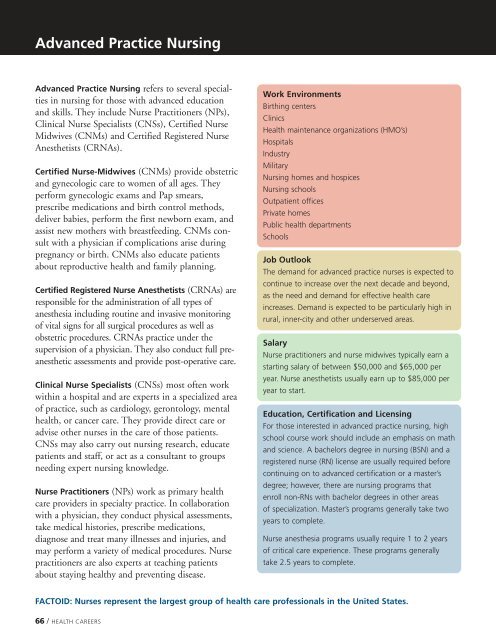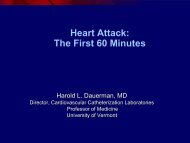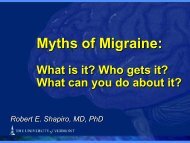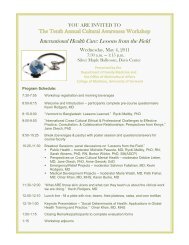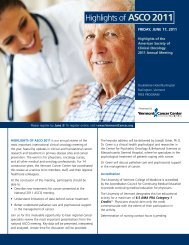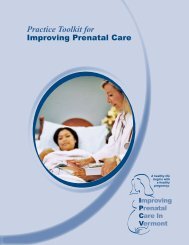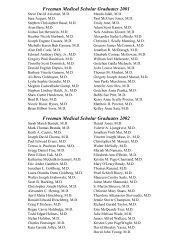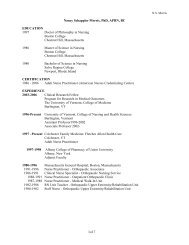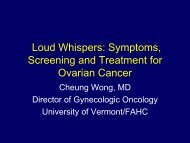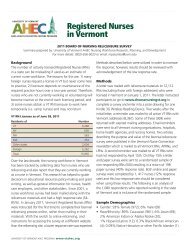Health Careers - College of Medicine - University of Vermont
Health Careers - College of Medicine - University of Vermont
Health Careers - College of Medicine - University of Vermont
Create successful ePaper yourself
Turn your PDF publications into a flip-book with our unique Google optimized e-Paper software.
Advanced Practice Nursing<br />
Advanced Practice Nursing refers to several specialties<br />
in nursing for those with advanced education<br />
and skills. They include Nurse Practitioners (NPs),<br />
Clinical Nurse Specialists (CNSs), Certified Nurse<br />
Midwives (CNMs) and Certified Registered Nurse<br />
Anesthetists (CRNAs).<br />
Certified Nurse-Midwives (CNMs) provide obstetric<br />
and gynecologic care to women <strong>of</strong> all ages. They<br />
perform gynecologic exams and Pap smears,<br />
prescribe medications and birth control methods,<br />
deliver babies, perform the first newborn exam, and<br />
assist new mothers with breastfeeding. CNMs consult<br />
with a physician if complications arise during<br />
pregnancy or birth. CNMs also educate patients<br />
about reproductive health and family planning.<br />
Certified Registered Nurse Anesthetists (CRNAs) are<br />
responsible for the administration <strong>of</strong> all types <strong>of</strong><br />
anesthesia including routine and invasive monitoring<br />
<strong>of</strong> vital signs for all surgical procedures as well as<br />
obstetric procedures. CRNAs practice under the<br />
supervision <strong>of</strong> a physician. They also conduct full preanesthetic<br />
assessments and provide post-operative care.<br />
Clinical Nurse Specialists (CNSs) most <strong>of</strong>ten work<br />
within a hospital and are experts in a specialized area<br />
<strong>of</strong> practice, such as cardiology, gerontology, mental<br />
health, or cancer care. They provide direct care or<br />
advise other nurses in the care <strong>of</strong> those patients.<br />
CNSs may also carry out nursing research, educate<br />
patients and staff, or act as a consultant to groups<br />
needing expert nursing knowledge.<br />
Nurse Practitioners (NPs) work as primary health<br />
care providers in specialty practice. In collaboration<br />
with a physician, they conduct physical assessments,<br />
take medical histories, prescribe medications,<br />
diagnose and treat many illnesses and injuries, and<br />
may perform a variety <strong>of</strong> medical procedures. Nurse<br />
practitioners are also experts at teaching patients<br />
about staying healthy and preventing disease.<br />
Work Environments<br />
Birthing centers<br />
Clinics<br />
<strong>Health</strong> maintenance organizations (HMO’s)<br />
Hospitals<br />
Industry<br />
Military<br />
Nursing homes and hospices<br />
Nursing schools<br />
Outpatient <strong>of</strong>fices<br />
Private homes<br />
Public health departments<br />
Schools<br />
Job Outlook<br />
The demand for advanced practice nurses is expected to<br />
continue to increase over the next decade and beyond,<br />
as the need and demand for effective health care<br />
increases. Demand is expected to be particularly high in<br />
rural, inner-city and other underserved areas.<br />
Salary<br />
Nurse practitioners and nurse midwives typically earn a<br />
starting salary <strong>of</strong> between $50,000 and $65,000 per<br />
year. Nurse anesthetists usually earn up to $85,000 per<br />
year to start.<br />
Education, Certification and Licensing<br />
For those interested in advanced practice nursing, high<br />
school course work should include an emphasis on math<br />
and science. A bachelors degree in nursing (BSN) and a<br />
registered nurse (RN) license are usually required before<br />
continuing on to advanced certification or a master’s<br />
degree; however, there are nursing programs that<br />
enroll non-RNs with bachelor degrees in other areas<br />
<strong>of</strong> specialization. Master’s programs generally take two<br />
years to complete.<br />
Nurse anesthesia programs usually require 1 to 2 years<br />
<strong>of</strong> critical care experience. These programs generally<br />
take 2.5 years to complete.<br />
FACTOID: Nurses represent the largest group <strong>of</strong> health care pr<strong>of</strong>essionals in the United States.<br />
66 / HEALTH CAREERS


